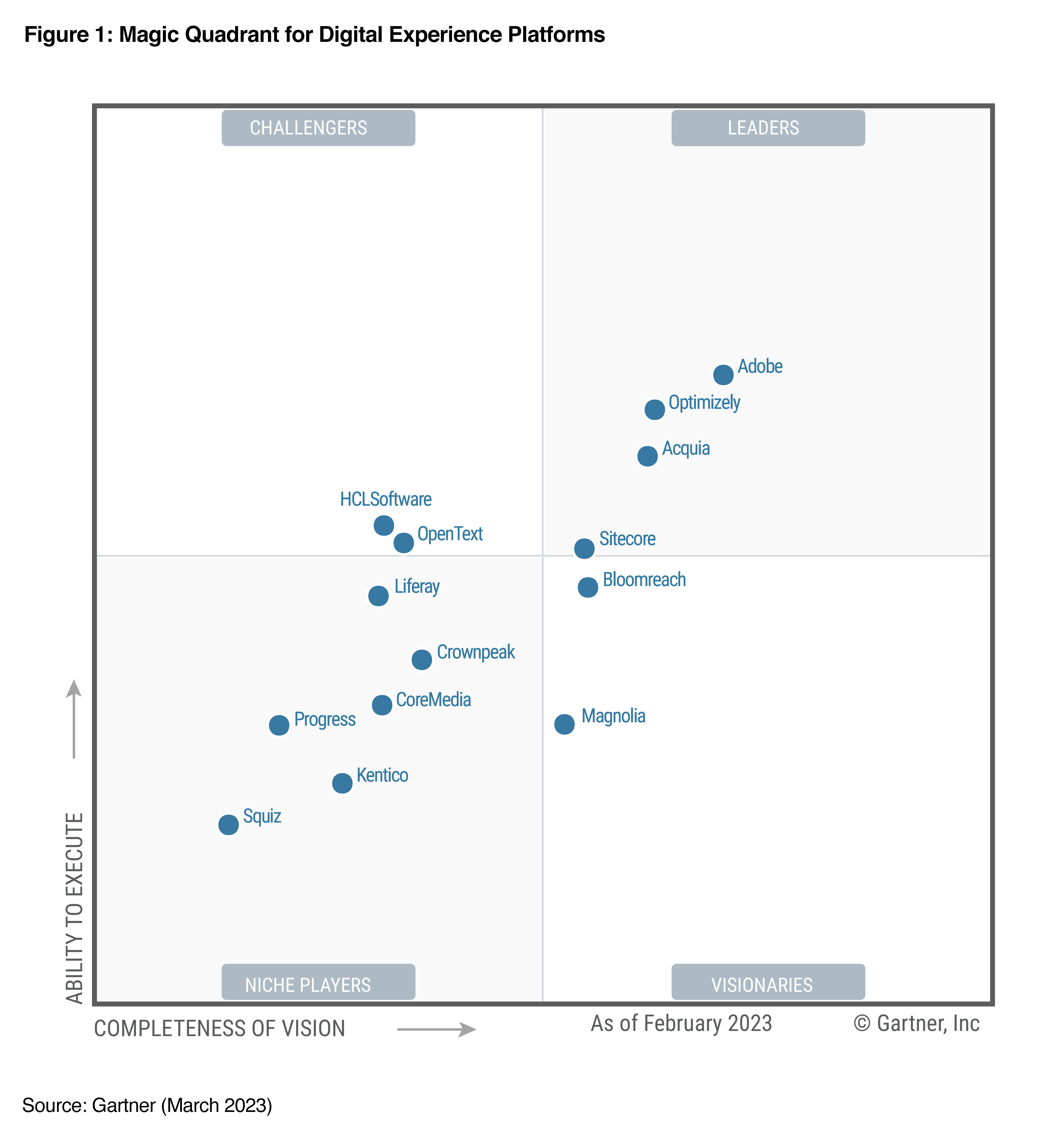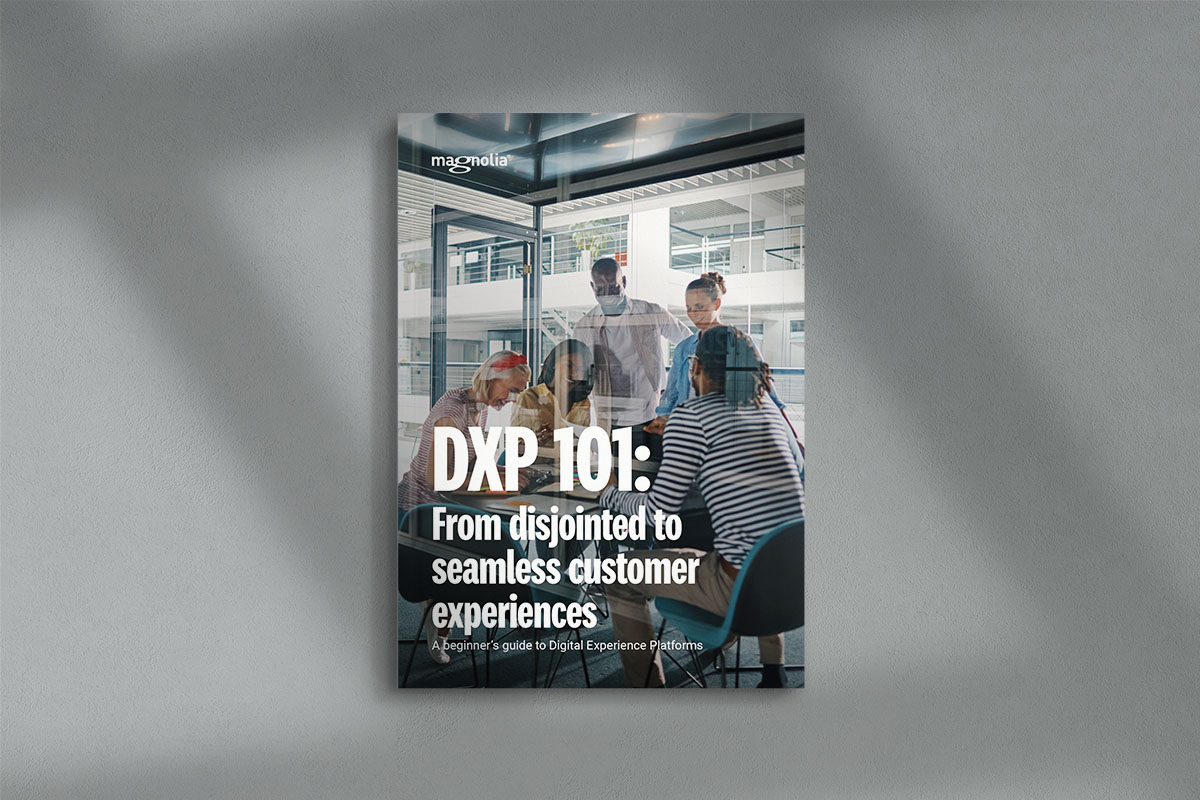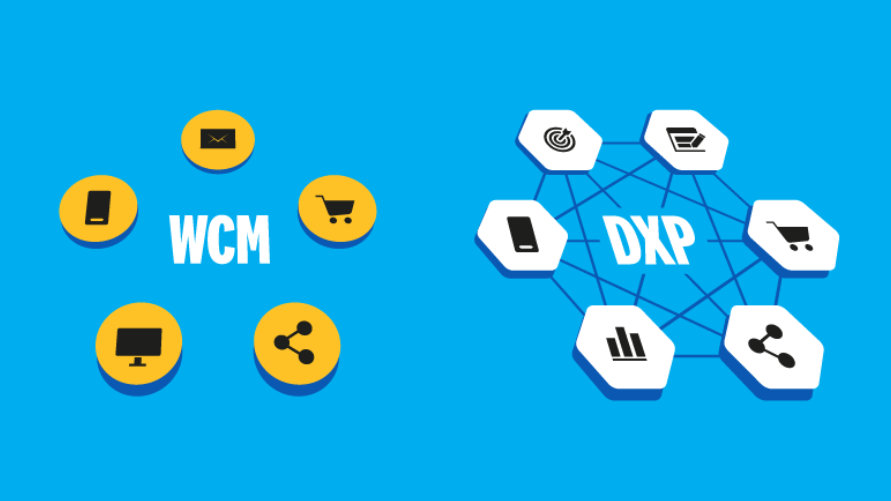Shifting from WCM to DXPs
Gartner retired this report category in 2020. The world of web content management (WCM) has evolved, and we're now in the era of digital experience platforms (DXPs).
Don't worry. Gartner still evaluates each platform's content management capabilities. DXPs like Magnolia offer a single platform for managing content and digital experiences. With a user-friendly, unified authoring interface, seamless integrations with adjacent technologies, and tools for personalization, analytics, optimization, and customer journey mapping, you can streamline your digital delivery to create exceptional digital experiences across multiple channels.
Let’s explore the shift from WCM to DXPs, emphasizing insights by Mike Lowndes, Irina Guseva, John Field, and Jim Murphy, analysts at Gartner, Inc. We will also uncover the key offerings that we believe have propelled Magnolia to be included in the analysts’ report.

What is a DXP?

A digital experience platform (DXP) is a software solution that enables you to create and manage your content, integrate systems, gain valuable insights, and deliver personalized digital experiences to your individual customers across various channels. With a DXP, you can ensure consistent branding, improve operational efficiency, gain customer loyalty, adapt to market changes and customer demands, and scale your digital presence.
Download our white paper DXP 101: From disjointed to seamless customer experiences as a beginner’s guide to Digital Experience Platforms.
By 2025, the global DXP market is anticipated to be valued at around $15.80 billion, according to industry projections. Digital experience strategies enable a remarkable 99% reduction in time to market, allowing businesses to deliver their offerings with unprecedented speed. In a survey by CMSWire, nearly 80% of digital experience executives emphasized the importance of exceptional customer experience for their organizations.
These insights highlight the profound impact of DXPs in facilitating faster market entry and personalized digital customer experiences — but how is this different from web content management?
Web content management (WCM) vs. digital experience platforms (DXPs)
WCM has long been crucial in helping businesses manage and publish their web content. It provided a way to organize, update, and present website information, ensuring a consistent online presence.
However, as the digital landscape evolved, businesses realized the need for a more comprehensive solution to deliver a broad range of exceptional digital experiences. This led to the emergence of DXPs, which build on the foundation of WCM and offer a more composable approach to content and commerce.

Here are some key differences between WCM and DXPs:
Scope – WCM primarily revolves around content creation, management, publishing, and simple personalization for websites. In contrast, DXPs offer a more comprehensive approach, incorporating content management systems, customer data management, advanced personalization, digital asset management, cloud capabilities, customer journey mapping, analytics, marketing automation, and multi-channel delivery to meet business goals and create engaging digital experiences.
Customer Experience Focus – Whereas WCM emphasizes managing content, DXPs prioritize customer journey management across multiple digital touchpoints. DXPs aim to create cohesive customer journeys and enable businesses to meet customer expectations at various stages of their interaction.
Personalization and Targeting – DXPs enable advanced personalization capabilities, leveraging customer data to deliver tailored experiences based on individual preferences, behaviors, and demographics. WCM may have limited personalization capabilities, mainly focused on simple rule-based targeting.
Omnichannel Experience – DXPs facilitate consistent and seamless experiences across a wide range of digital channels, including websites, mobile apps, customer portals, social media, email, and more. WCM typically focuses on website-centric experiences and often has limited support for other channels.
Gartner insights
Based on reviews on Gartner Peer Insights, Magnolia stands out with innovative digital experience capabilities and high customer support ratings, earning recommendations from more than 75% of respondents.
The reason for this success is not a mystery. Magnolia's core capabilities make it easy to set up a DXP and integrate the best tools. With an intuitive interface and user-friendly features, Magnolia supports your go-to-market strategies by enabling your digital marketing team to create captivating digital content and deliver personalized experiences.
According to Gartner, a significant majority — approximately 85% — of your effort and investment in a DXP program will be focused on integrating internal and external systems. With its Connector Packs and APIs, Magnolia extends natively into other core technologies that make up your composable DXP, reducing the complexity, effort, and time required for setup. As a result, the cost of integration is significantly minimized.
In Gartner's 2023 Magic Quadrant Report, Magnolia was recognized for the 3rd year in a row. We think we’ve been acknowledged as a visionary for our open, modular architecture, a unified approach to integrations, and our enterprise-grade editorial capabilities.
The value of the DXP
DXPs are essential tools that empower you to transform fragmented customer experiences into seamless, engaging journeys. By leveraging the insights provided by Gartner and choosing leading DXPs like Magnolia, you can enhance your digital strategies, improve customer engagement, and deliver exceptional experiences across all digital channels to match your and your customers’ unique needs.
FAQs
What is Gartner known for?
Gartner is a well-known research and advisory firm. The company provides valuable insights and advice to businesses. Gartner is famous for its research reports, market assessments, and Magic Quadrant evaluations, helping companies make informed technology decisions. Gartner is trusted for their objective and unbiased approach, offering guidance to technology users, vendors, and service providers. With a global presence, Gartner has a significant impact on the business and technology landscape.
What are the four quadrants in the Gartner Magic Quadrant?
Gartner's Magic Quadrant is divided into four sections: Leaders, Challengers, Visionaries, and Niche Players. In Gartner’s research methodology, the sections represent different types of technology providers based on their completeness of vision and ability to execute. The Leaders quadrant includes companies that demonstrate vision and execution capabilities, and that usually have a strong market presence. Challengers are companies with a strong execution track record but a less defined vision. Visionaries are known for their innovative ideas and forward-thinking vision. Niche Players have a narrower focus or limited market presence but may excel in specific areas.
What is the Gartner Magic Quadrant report?
The Gartner Magic Quadrant is a research methodology and graphical representation developed by Gartner, a leading research and advisory firm. It evaluates technology markets and provides a visual snapshot of the key players in a specific market segment. The report assesses companies based on their completeness of vision and ability to execute.
The Magic Quadrant categorizes companies into four sections: Leaders, Challengers, Visionaries, and Niche Players. It helps businesses understand the competitive landscape, identify market trends, and make informed decisions when selecting technology vendors or service providers. The Gartner Magic Quadrant is widely recognized and influential in the technology industry.
What is an example of a digital experience platform (DXP)?
Magnolia is a composable digital experience platform (DXP) that helps enterprises create fully integrated customer experiences and speed up digital experience delivery across various channels. Magnolia consolidates all content in one content hub and connects to any data source, application, or channel through easy integrations. With Magnolia’s unified authoring, marketing teams and creative agencies can easily manage content and personalize experiences.
About the Report
Title: 2023 Gartner Magic Quadrant for Digital Experience Platforms
Analysts: Irina Guseva, John Field, Mike Lowndes, and Jim Murphy
Published: March 14, 2023
Disclaimer
Gartner does not endorse any vendor, product or service depicted in its research publications, and does not advise technology users to select only those vendors with the highest ratings or other designation. Gartner research publications consist of the opinions of Gartner's research organization and should not be construed as statements of fact. Gartner disclaims all warranties, expressed or implied, with respect to this research, including any warranties of merchantability or fitness for a particular purpose.
This graphic was published by Gartner, Inc. as part of a larger research document and should be evaluated in the context of the entire document. The Gartner document is available upon request from Magnolia.
GARTNER is a registered trademark and service mark of Gartner and Magic Quadrant is a registered trademark of Gartner, Inc. and/or its affiliates in the U.S. and internationally and are used herein with permission. All rights reserved.

